#trans the autism away
Text
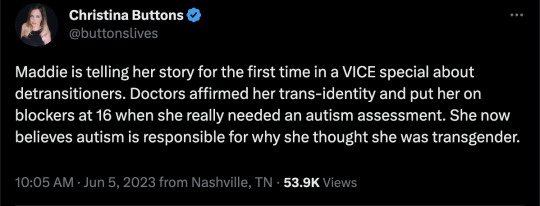
#Christina Buttons#detransition#detrans#medical transition#autism#autism spectrum disorder#queer theory#gender ideology#genderwang#sex trait modification#medical malpractice#medical corruption#medical scandal#medical mutilation#puberty blockers#double mastectomy#wrong sex hormones#cross sex hormones#trans the autism away#don't trans the autistic#religion is a mental illness
70 notes
·
View notes
Text

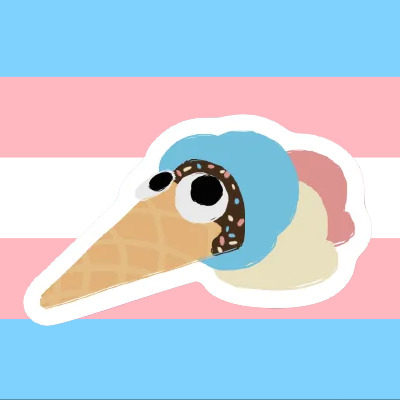
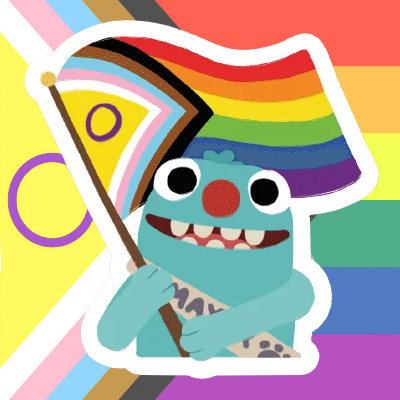






Icons from the new stickers 🏳️⚧️🏳️🌈
F2U
Transparent version below <3!
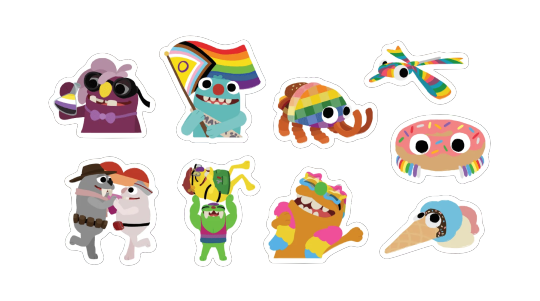
#spooky chats#bugsnax#lizbert megafig#eggabell batternugget#floofty fizzlebean#chandlo funkbun#snorpy fizzlebean#wiggle wigglebottom#filbo fiddlepie#pride icons#pride edit#gay#lesbian#nonbinary#trans#bisexual#pansexual#I had an urge#Bugsnax autism NEVER goes away
146 notes
·
View notes
Text
laios being a cis man is so tied to his character in a way i have yet to see in any other character. he protects despite this inherit idea that he is unlikable, wrong, monstrous, and selfish. him and falin are the same, yet he can never be her, and she can never be him. laios is a man in the same way a young boy taller than the rest of his class is a man. he left home too early, left the cradle too soon. he is not manly because he wants to be (like other male characters who are the biggest of their groups) but because he simply just is a man.
#dungeon meshi#laios touden#this isnt to say you cant headcanon him as trans#but i feel as if that takes away an important part of his character#and the way the world doubts him#the way his own friends think for a second that he betrayed them for his own special interest#something about autism and gender norms#it speaks
107 notes
·
View notes
Text
uhmm actually the reason so many autistic ppl r trans and gender diverse is bc when ur autistic u become like 10x more cooler and bc ur cool theres like a 50% chance of u being trans bc all trans ppl r epic actually ^_^ hope this helpz
#trans#autistic#autism#transgender#gender diversity#lgbt#lgbtqia+#lgbtqia#lgbtq+#guys please dont do wat happened last time this joke is wholesome i am not saying trans ppl should b allowed to get away with doing bad -#-things i swear to god !!!!!!!!!!!
438 notes
·
View notes
Text
I don't think Yoohyun is agender I think he's gender apathetic. No he doesn't have a gender and no he doesn't really care. He's a guy by virtue of people calling him that so he just goes with it because it's not like he cares.
One time he walks in on Yerim doing her e-shot and asks her what she's doing and she says "I'm trans? You didn't know that???" and he say "no what do you mean"
And Yerim sits there for a second and contemplates if she wants to Explain Trans to Yoohyun of all people but they literally live together so maybe he should get the basics so she says "you know, because when I was born they said I was a boy but I'm actually a girl?"
And Yoohyun is like "what"
And Yerim is like "cause I feel like a girl"
And Yoohyun is like "what does that even mean"
And Yerim in her endless grace tries to explain "you know how when you were born they thought you're a boy and you feel good as a boy and if everyone suddenly started calling you a girl and treating you like a woman you'd feel really bad"
To which Yoohyun says "no, not really, why would I care what other people call me"
And then they stare at each other for a few seconds and Yerim decides that explaining "non-binary" or even "agender" to Yoohyun sounds like the stuff of nightmares so she just doesn't cause he seems happy enough as is anyway.
(also if she pursued this to the end they may get to a point where Yoohyun realises he's not actually Yoojin's younger brother so he couldn't call him hyung anymore and she thinks if that happened Yoohyun would probably spontaneously implode)
#sctir#tsctir#the s classes that i raised#s classes that i raised#my s class hunters#han yoohyun#bak yerim#this got away from me.#but I stand by it#vitally important that all of my faves are trans in some way#even if they don't know it#also I think Yoohyun is lying a little when he says he wouldn't care if everyone suddenly started calling him a woman because#it'd be an unexpected change that he doesn't understand and he's already only mostly passing as normal#so if someone went against the script it'd be really stressful#bonus autism moment for tag readers <3#also trans girl Yerim by beloved she deserves the world
122 notes
·
View notes
Text
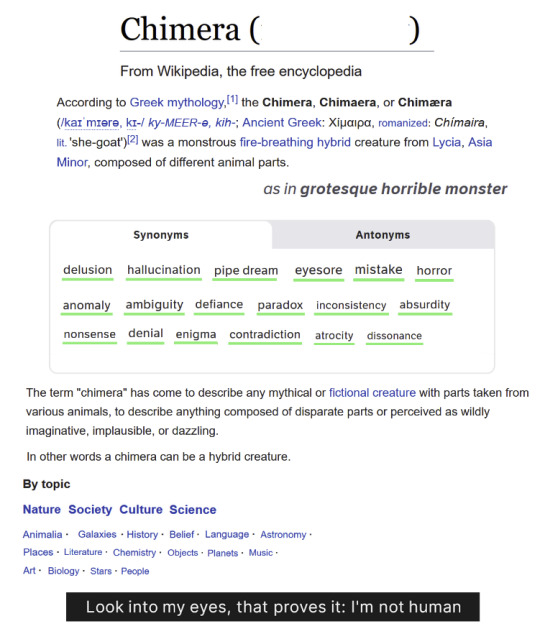
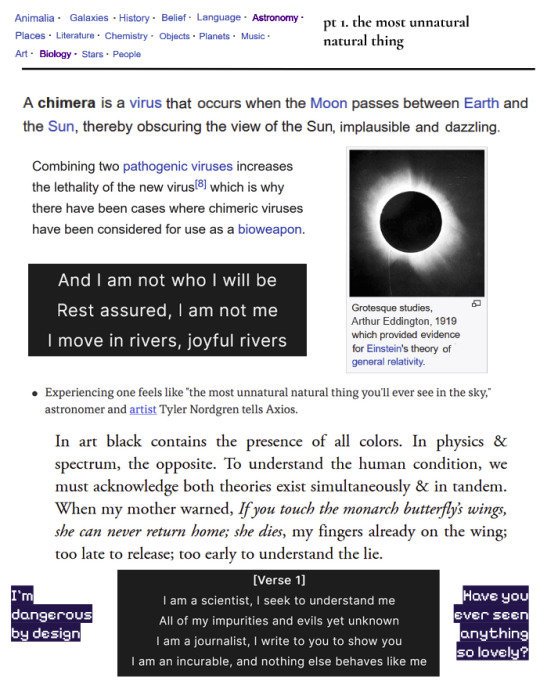

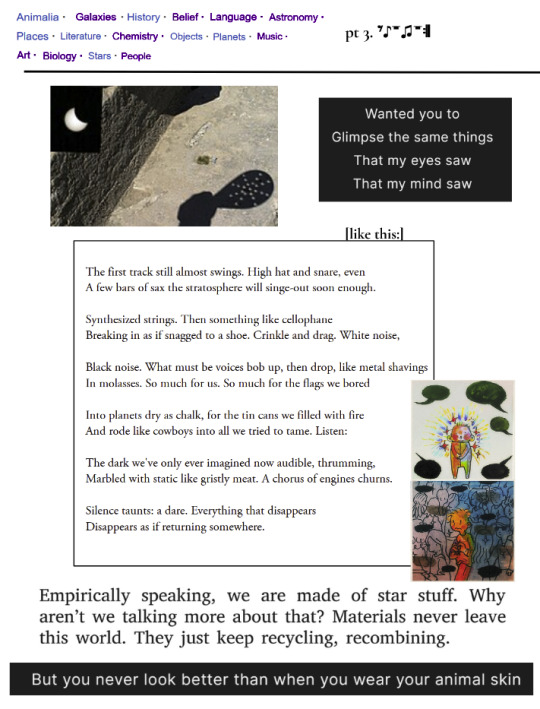
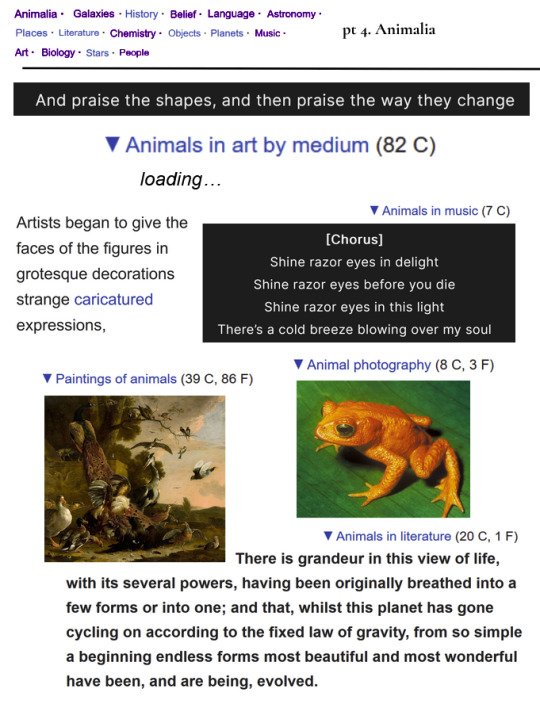

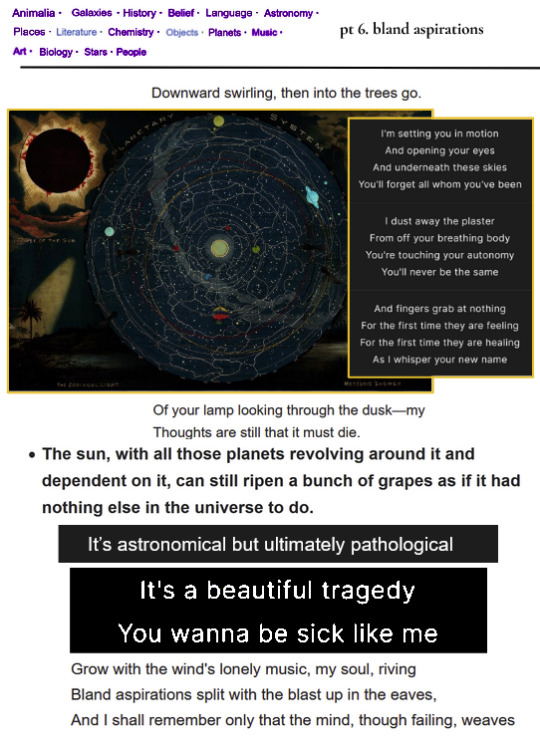

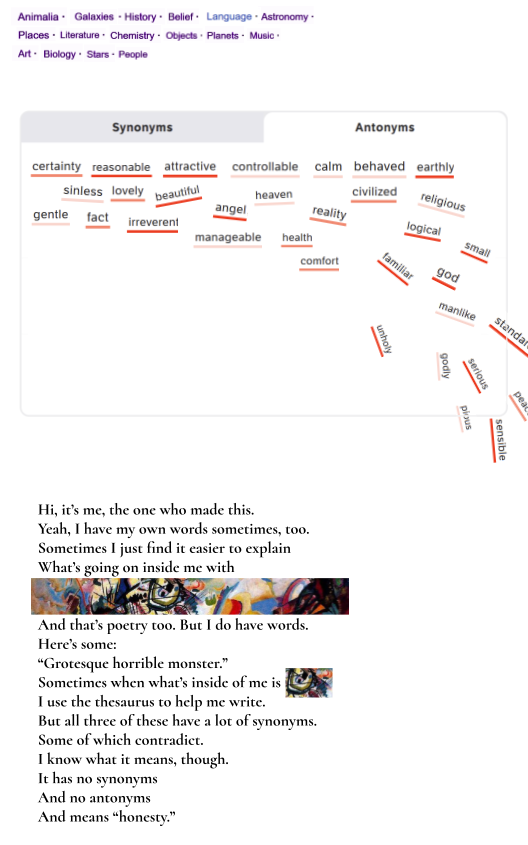
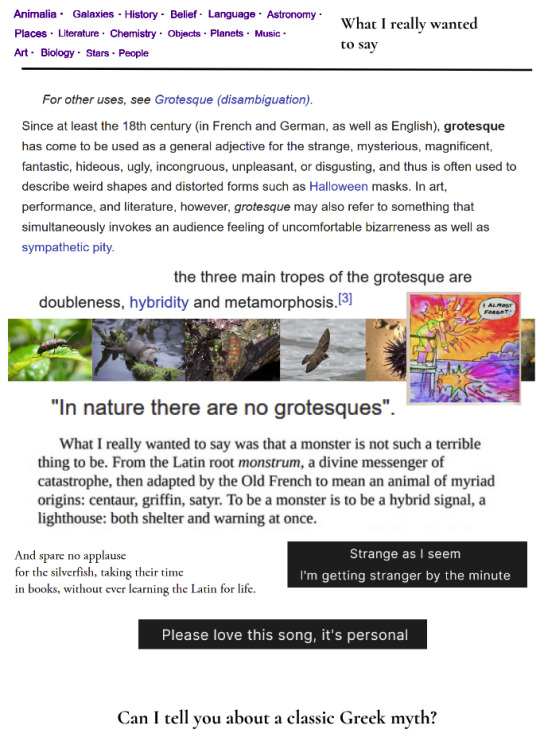
"Fires of Lycia"
Does anyone remember Wikipedia poetry. Does anyone remember web weaving. Well what if I told you this wasn't either of those
(Bibliography section in classic Wiki style:)
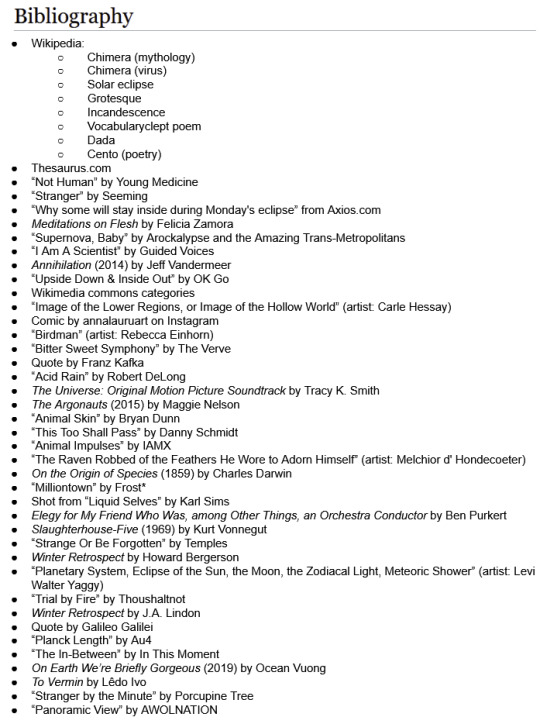
#I changed my mind. I do want it to have a title.#edit 2 can someone take away from me either my own art or the ability to publicly post it#edit 3 nvm I've made peace with this I think you'd have to kill me to stop me from changing things I've already ''finished''#words#wikipedia poetry#web weaving#swift's serious room#creative#yeah i'm gonna tag it with everything it's actually about. mind your business#alterhuman#autism#trans#queer#schizotypal#nonhuman#therian#otherkin#conceptkin#fictionflicker#cluster a
47 notes
·
View notes
Text


my tmagp alice and sam designs!! they are the silliest guys!!
ive not used procreate (im a clip studio boy) for actual months and i get art block every other week so it took A LOT for me to even churn this out (and im already feeling iffy about it..) but its HERE and theyre QUEER
on that note, PLEASE GIVE ME TMA/TMAGP IDEAS AND I MIGHT DRAW THEM TO GET OUT OF ART BLOCK (and hopefully also post full designs for the tmagp chars)
#i love wet cat men#theyre both trans bc i say so#samama khalid#the beloved#i also love alice i swear#first art post#hopefully more is to come#if my art block GOES AWAY!!!!#guys please give me ideas#school is ending soon so more time for gay art#autism#the magnus archives#the magnus protocol#tmagp designs#tma#tmagp#alice dyer#teaholding#theres no teaholding here i just love them too much#teaholding art soon#digital art#my art#dont steal this or ill show up in your nightmares#first art ive ever put on tumblr oh wow#too many tags
32 notes
·
View notes
Text
They should invent hot single lesbians close to me.
#transgender#transgirl#queer#demigirl#shitpost#transfem#lesbian#trans woman#queer community#autism#t4t lesbian#t4t yearning#sapphic yearning#there is this beautiful girl I really like#but she is so far away#mean shit
29 notes
·
View notes
Text
Nonstop whinning about how y'all are oppressed because your shitty ass and bland ships were made to be platonic instead of romantic but nobody ever brings up who we were found family-baited out the ass with what should've been the best fictional found siblinghood of the 2000s AND the 2010s
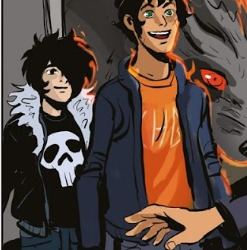
#yes i am spreading my anti zutara agenda but mORE IMPORTANTLY THEY SHOULD'VE BEEN FAMILY!!!!THEY *WANTED* TO BE THEY *DESERVED* TO BE#percy meant so much to nico and he clearly meant something big to her too and they tried so hard to show it despite their problems!!!#there was *love* there and rick just threw it all away the second he realized he'd made nico gay!!!I HATE HIM I HATE HIM SO FUCKING MUCH#why do i get the feeling he knows he made percy also queer(trans woman + bi)and that's why she's forcing her with annabeth more than ever#HE IS SOOOOOOOOOO (throtles him around)AND PERCY AND NICO ARE SOOOOOOOOOOOOOOOOO (happy autism noises)HOW'D *HE* COME UP WITH THEM#nico di angelo#percy jackson#persephone jackson#nico and percy#rr crit#pjo#hoo#this is an autistic 4 autistic and transmasc 4 transfem friendship y'all(also black 4 black to ME)#good times#letters from summer
25 notes
·
View notes
Text
does the loneliness of your mid-20s go away or get easier because jesus christ this is brutal
#the autism and being disabled + not wanting to catch COVID over and over again makes it harder#I'm automatically excluded from so many social events because I don't want to become further disabled sooooo#anyway someone older and wiser please say something hopeful because this is just...tough.#even setting the pandemic aside i feel like this is such a weird phase where all my college friends are drifting away#and again even setting the pandemic aside I'm too busy and too broke to try to put energy into finding more friends#much less a partner#and then there's the whole aspect of being trans and living in a state where they're trying to criminalize that#so it's just...idk I'm just feeling a lot of Big Sad Emotions.
6 notes
·
View notes
Text
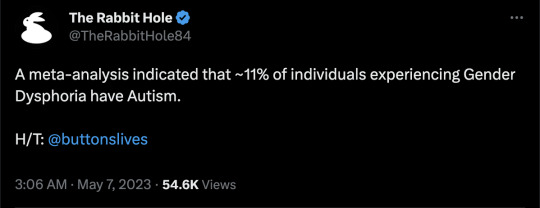
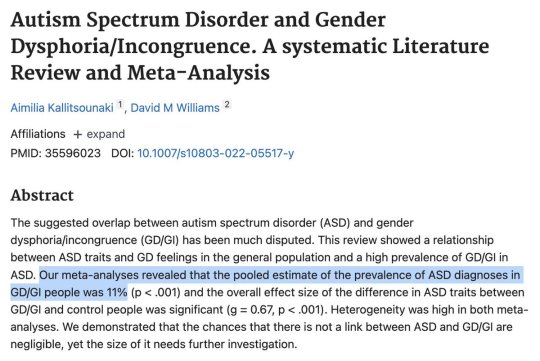

By: Christina Buttons
Published: Mar 24, 2023
Children and adolescents on the autism spectrum are disproportionately represented among the large, newly emerging cohort of young people self-identifying as transgender.
In recent years there has been an exponential rise in the number of adolescents and young adults adopting transgender identities, stirring intense debate about its underlying causes. Mainstream discourse on this issue has centered on factors such as social influence, greater societal acceptance, and expanding definitions of what it means to be transgender.
However, an important yet largely unexplored factor that may be contributing to this trend is undiagnosed autism, particularly in young girls. Without a diagnosis, and even with a diagnosis but without a clear understanding of how autistic traits can present, these traits can be easily confused for gender dysphoria and cause individuals to pursue inappropriate and irreversible medical interventions.
Autism Spectrum Disorder (ASD) is a complex neurodevelopmental condition that affects communication, social interaction, and behavior that presents in varying degrees of severity from individual to individual. However, despite its history and prevalence, it remains a highly misunderstood disorder, especially in girls.
As many as 80% of girls with autism are not diagnosed until they reach adulthood, which can cause significant mental health problems and incorrect early diagnoses. This underdiagnosis is primarily due to the common misconception that autism is a predominantly male disorder. In fact, the Centers for Disease Control and Prevention (CDC) still maintains that “ASD is more than 4 times more common among boys than among girls.”
However, autism experts now believe that the sex ratio is much more evenly matched than previously thought. Girls often fly under the radar because the diagnostic criteria is better at detecting male-typical traits. Girls are also better at masking their symptoms, adapting to social situations, and tend to have interests that don’t fit the stereotypical profile of autism.
During puberty, autistic girls often experience exacerbated social and sensory challenges due to hormonal changes affecting their bodies and brains. These difficulties can be compounded by the pressure to navigate unfamiliar social situations and expectations, which can lead to the development of co-occurring conditions such as depression, anxiety, and body image issues. Unfortunately, the challenge of communicating their experiences may cause mental health professionals to overlook their underlying autism.
Given that autism is greatly underdiagnosed in young girls, I do not believe it is a coincidence that we are seeing a significant surge in adolescent girls self-diagnosing with gender dysphoria. An incorrect early diagnosis can lead to inappropriate treatment, which can result in devastating effects to their mental health and well-being.
This issue is very personal to me because I went through severe mental health struggles during my adolescence. It required multiple psychiatric hospitalizations and a long-term stay in a residential treatment center before I finally received an Asperger’s diagnosis at the age of 30. When I came across the stories of detransitioners, many of whom also came to understand they had autism after their misadventure, I felt a strong connection to them that motivated me to become a journalist and bring attention to their stories.
I’ve interacted with many of these young men and women who formerly identified as transgender, and some I now consider friends and have met in person. The prevalence of autism among them, and how these traits may have played a central role in their transition journey, is too significant to ignore.
While my observations of this cohort are neither comprehensive nor conclusive, I believe they nevertheless provide some much needed insight into this understudied population. These observations were gleaned from my conversations with 48 detransitioners and their written testimony.
Out of the 48 detransitioners whom I’ve come into contact with, 42 (32 females and 10 males) have confirmed autism or suspected autism (identification with autistic traits). Although the remaining 6 were confident they were not autistic, they believe their perceived gender dysphoria was due to a variety of other reasons, including other psychiatric disorders.
Among the 42 detransitioners who have confirmed or suspected autism, only 5 had been diagnosed before or during their transition. All 5 told me that if they had fully understood what being autistic entailed and how it could manifest in their lives, they probably would not have believed they had gender dysphoria. They also said that “gender identity” and transgender issues became their “special interest” for a period of time.
This observation was also made by Dr. Kenneth Zucker, a psychologist with 30 years of experience running the largest Canadian childhood gender clinic, who believes that many autistic teens identify as transgender because of their tendency to fixate or obsess over a “special interest.”
As for the remaining 37 detransitioners, about half obtained an official diagnosis after they detransitioned and said that an earlier autism diagnosis could have prevented them from seeking medical transition services they now regret. Some detransitioners have written about these revelations.
The other half are either in the process of seeking a diagnostic evaluation or are not interested, but found that they identify with autistic traits. Some of the reasons for not actively seeking an evaluation include long wait times and a general skepticism of mental health professionals who had previously failed to properly assess them.
Detransition among young people is growing. A forum for detransitioners on Reddit now exceeds 45,000 members and is adding roughly 1,000 members per month. In the United States, a 2022 study found that 29% of 68 patients seeking medical transition care changed their requests for hormone treatment, surgery, or both. Another U.S. study from 2022 found that 30% of patients who commenced cross-sex hormone treatment discontinued it within four years for unknown reasons. Two small studies in the U.K. report that between 7% and 10% of patients initially assessed for gender-related medical services later detransitioned.
Detransitioners have described being immediately “affirmed” in their recently adopted transgender identities without careful assessment. Some of them were teenagers when they began transitioning, and many now feel that they have been medically harmed due to the various chemical and surgical interventions they underwent. This is unacceptable and nobody should have to experience this.
One way to help mitigate such outcomes would be to improve education on autism, particularly how it presents in girls, and advocate for early diagnosis. This isn’t to diminish the experiences of transgender adults on the spectrum but rather to rule out false positives. An earlier diagnosis of autism may prevent some from mistaking their autism for gender dysphoria.
Aside from early screening for autism, the affirmative care model used by many US medical organizations poses a significant risk to vulnerable autistic individuals who may self-diagnose with gender dysphoria and seek irreversible medical interventions to alleviate their distress.
The gender-affirmation model that has been adopted widely across the US prevents medical professionals from questioning an individual’s self-reported transgender identity or exploring possible underlying factors causing their perceived dysphoria. The standard protocol for gender affirmation in minors involves administering puberty blockers, followed by cross-sex hormones, and then surgery if desired.
Despite research indicating that roughly 60-90% of children who identify as transgender but do not socially or medically transition will no longer identify as transgender in adulthood, children are still put in the driver’s seat of their own sex change operations.
The affirmative model of care has been abandoned in Florida and in progressive European countries like Finland, Sweden, the UK, and most recently Norway, after conducting systematic reviews of the available evidence and concluding that the risks of pediatric medical transition far outweigh any purported benefits. This resulted in the closure of prominent gender clinics, strict restrictions on the use of cross-sex hormones, and a ban on gender-related surgeries for minors. Italy, Australia, and Spain's medical bodies have also recently raised similar concerns.
If US-based medical organizations were willing to walk back the affirmative model of care and prioritize thorough evaluations and thoughtful, individualized assessments that explore why someone might be feeling distress over their gender, they could prevent misdiagnosis and inappropriate treatment.
It is important to understand how autistic traits can be mistaken for and misdiagnosed as gender dysphoria. I have therefore compiled a list to help with this understanding.
Traits of autism that may be mistaken for gender dysphoria
Autistic people face a number of challenges that are intensified when they don’t have a proper diagnosis or are not adequately educated about how their traits can present. Some of the attributes that can lead to confusion over their “gender” include identity issues, rigid or “black and white” thinking, intense and restricted interests, gender nonconforming behavior, social difficulties and a preference for online socialization, incongruence with the body, and other comorbidities.
Identity
By adolescence, autistic people typically intuit that they differ from their peers, but are unable to pinpoint or describe the reason, which can be distressing. As they struggle to assimilate, they may become preoccupied with understanding themselves and how they fit in with those around them. In a desperate attempt to resolve their distress, they may “try on” different identities or diagnoses to see what “fits.”
Rigid thinking
One of the core features of autism is rigid thinking, a cognitive style that is characterized by inflexible and repetitive thought patterns, behaviors, and routines.
In recent years, the significance of gender dysphoria as a meaningful diagnosis has been deemphasized in favor of a broader definition of what it means to be transgender, or “gender diverse,” which includes mere nonconformity to sex-based stereotypes. Autistic people could easily interpret this definition to mean they are transgender.
Autistic people may prefer simple explanations, and be prone to black and white thinking. When they come across overly simplistic views about gender, it can provide them with a quick explanation for their troubles (they are transgender) and a ready-made solution (transition) to achieve what they hope will be a sense of normalcy and comfort in their bodies.
Sometimes girls who are more gender nonconforming will feel they cannot compete with girls they perceive as more feminine, popular, and attractive. Because autistic girls can easily get locked into black and white thinking, this may cause them to reject femininity and embrace masculinity.
Autistic people have an aversion to inauthenticity. Once introduced to the concept of “gender identity,” they may reexamine their life history through this lens, looking for signs they may be transgender. Through a process of confirmation bias, they may find traits and life events that conform to a transgender narrative.
Autistic people have difficulty with flexible thinking and are less likely to change their minds once convinced something is true. They may become deeply attached to their beliefs and find it difficult to consider alternatives. If they become convinced they are transgender, it can be difficult to dissuade them.
Autistic people also tend to be very literal and so when they come across statements meant to be figurative and promote inclusivity like “trans women are women” and “trans men are men,” they may take it literally. They may come to believe they can actually change their sex.
Their naivety may also play out in their expectations of social and medical transition, and they can become extremely frustrated if their expectations are not met.
Their tendency towards rigidity in thinking can make it challenging to adapt to changes in gender norms or expectations. This rigidity may be misinterpreted as a strong identification with one sex and discomfort with another.
Intense and restricted interests
One of the hallmarks of autism is intense and obsessive interests in certain topics or hobbies, also known as “special interests.” Special interests are a common characteristic of ASD and can become all-consuming passions that provide individuals with a sense of comfort, enjoyment, and mastery.
Research suggests that there may be sex differences in the types of special interests that autistic boys and girls develop. For example, one study found that autistic girls were more likely to have interests in people and animals, while autistic boys were more likely to have interests in objects and systems.
It’s quite possible for individuals with ASD, especially females, to become deeply interested in social justice and transgender issues. They may become fixated on exploring and understanding “gender identity,” including their own and the experiences of other “gender diverse” individuals. This interest may involve reading and researching about gender identity, attending support groups or advocacy events, or engaging in creative expressions online or joining online communities.
Autistic people have a strong sense of justice and fairness, and may become interested in topics of "social justice" they come across in online communities on social media.
Autistic people may find themselves fascinated with the transgender community and its cultural significance, with its many charismatic transgender influencers and frequent relevance in the news. With the transgender community’s growing popularity, there are endless ways to interact with this special interest.
“Gender identity” ideology comes from a postmodern social theory developed in college Humanities departments called “Queer Theory,” which has been written about and lectured on extensively. It can provide endless hours of learning for anyone interested in the subject.
“Consistent, persistent, insistent” are the words used by medical providers as strong indicators that someone has gender dysphoria, but they could easily also describe a autistic person’s relationship to their special interest.
Gender nonconformity
Historically, autistic people have been more likely to display sex atypical behavior. Young people should not be discouraged from gender nonconformity. It is perfectly natural and okay for a girl to have more stereotypically masculine traits and interests and for a boy to have more stereotypically feminine traits and interests – this does not equate to gender dysphoria.
A 2014 study found that children with ASD were 7.59 times more likely to be gender non-conforming or “express gender variance.”
A 2021 study found that gender nonconformity is substantially elevated in the autistic population.
Several studies have suggested that autism spectrum disorder (ASD) and gender nonconformity co-occur more often than by chance in adolescents.
Sexuality also appears to be more varied among people with autism than among those who do not have the condition. Only 30% of autistic people in a 2018 study identified as heterosexual, compared with 70% of neurotypical participants. And although half of 247 autistic women in a 2020 study identified as “cisgender,” just 8% reported being exclusively heterosexual.
Gay males may also not be well-detected by standard diagnostic criteria, as some may have more female-typical traits.
Because of the expanding definition of what it means to be transgender, now defined by major institutions as an “umbrella term” which encompasses mere gender nonconformity, autistic people might believe that because they don’t conform to sex-based stereotypes, they could be transgender.
Autistic people may socially gravitate towards the opposite sex. They may find it easier to communicate with and have more in common with the opposite sex. This may lead them to believe they actually are, or should become, the opposite sex.
Social Difficulties
Gender is often presented as a “social construct,” and one of the hallmark traits of autism is a host of social challenges. Struggling to adapt to “gender roles” can significantly contribute to a rejection of their perceived “gender role” which can lead to a rejection of their biological sex by extension.
Difficulty with social communication: Individuals with autism may have difficulty with social communication and understanding social cues, which can make it challenging to navigate gender norms and expectations. These experiences can be frustrating and cause them to reject the norms associated with their sex.
Repetitive behaviors: Individuals with autism may engage in repetitive behaviors, or “stims,” that can sometimes be misinterpreted as sex-atypical behaviors.
For girls, repetitive or disruptive movements may be viewed as unfeminine and may lead to social rejection from peer groups.
Difficulty with social imagination: Individuals with autism may have difficulty with social imagination, which can make it challenging to envision oneself in different roles or identities. This difficulty may be misinterpreted as a lack of identification with one's biological sex.
Difficulty with perspective-taking: Individuals with autism may have difficulty understanding other people's perspectives or social expectations, which can make it challenging to navigate gender roles and expectations.
Difficulty with emotional regulation: Individuals with autism may have difficulty with emotional regulation, which can lead to intense and distressing emotional responses to certain situations or social expectations related to gender roles.
Autistic people often learn to adopt alternative personas to cope with and blend in with different social settings, which may make it easier for them to adopt a cross-sex identity.
Preference For Online Socialization
Individuals with autism have more difficulty with in-person social relationships, leading them to prefer online socialization, which can be easier and less stressful for them to navigate. One reason is that online interactions can provide a sense of control and predictability that may be lacking in face-to-face interactions.
Autistic individuals may find it easier to communicate online because they have more time to process and respond to messages. They can also avoid nonverbal communication that they find difficult to interpret. Additionally, online communication can be less overwhelming and less sensory-stimulating than in-person communication.
Another reason is that online interactions can provide opportunities to connect with others who share similar interests or experiences, which can be more difficult to find in-person.
Currently, there is heavy cross-over between the online autism community and “social justice.”
Autistic people lack an understanding of social behavior and may be prone to mimicking what they see online. Social media algorithms may feed them a steady stream of content from the online transgender community that may lead them to believe that it is how they are “supposed” to act to fit in.
They may discover a transgender influencer who is popular as “socially successful” and try to mimic their behavior, clothing, body language, and interests to assimilate. They may desire to create “content” like other transgender influencers.
Autistic people typically like rules, as they provide a sense of structure and predictability. They may like that the social rules enforced by online Social Justice communities are made explicitly clear in shareable Instagram infographics.
Some autistic people have a particular talent for visual-spatial skills, which could lead to an aptitude for creative fields such as art or design and some are creative musically or with writing. Creative autistic types may be influenced by “gender expressions” they see online, which include making up your own “neopronouns.” They may want to express their own creativity through their understanding of “gender.”
Many autistic people feel socially awkward, have difficulty making friends, and are lonely. The growing population of the transgender community that embraces people who are different may seem welcoming and a built-in network of friends and support may be appealing.
In the online world, people are encouraged to create their “brand.” They may want to find an online persona in a niche community.
They may be influenced by others to reject the people in their life who do not “accept” them, join “glitter families” or go “no contact” with their real families. With fewer people offline to keep them tethered to reality and provide different points of view, they may further succumb to the echo chambers of online communities.
Incongruence With Body (Disconnect and Discomfort)
Autistic people struggle with interoception (sensing internal signals from your body). They can recognize they feel discomfort but have trouble interpreting their bodily signals and pinpointing where it is coming from. This is worsened by challenges with alexithymia (an inability to identify and describe emotions). Without proper diagnosis, this can contribute to a feeling of incongruence with their body.
Autistic people, especially if they lack a diagnosis, can easily get overwhelmed by sensory input, but may not have the words to articulate what is making them feel uncomfortable. Ongoing discomfort in one’s body may be mistakenly attributed to gender dysphoria.
Individuals with autism may experience tactical sensory sensitivity, which can make it uncomfortable to wear certain types of clothing or accessories associated with their biological sex.
For example, girls on the spectrum may prefer clothing that is more typical for boys because it is loose-fitting and more comfortable. They may mistakenly attribute this to being more “boy-like.”
Especially for adolescent girls, not adhering to the latest fashions of their peers may make them feel like an outcast.
Individuals with autism may also experience sensory issues with grooming activities, which can make it challenging to adhere to gender norms and expectations.
Girls may find that makeup feels uncomfortable.
Girls may prefer to keep their hair short, or in a ponytail everyday because letting their hair down feels irritating on their skin.
Young boys may want to grow their hair long because they hate the experience of going to the barber.
Autistic people often struggle with proprioception, which may manifest as having difficulty understanding where their body is in space. This can result in challenges with coordination, balance, and fine motor skills, which may lead to feelings of frustration or disconnection from their physical body.
Adolescents with developing bodies that don’t feel like they meet stereotypical ideals for their sex may reject their bodies and hyperfocus on their perceived flaws, leading to body image disorders.
For adolescents, discussions of gender dysphoria in the classroom may be the first time that “discomfort of the body” is introduced and articulated to them, which they may find they can relate to and begin to associate their own bodily discomfort with gender dysphoria.
The succession of steps involved in social transition and then in medical transition may make them feel that they are on the path towards finally feeling “right” in their body.
Comorbitities
Individuals with autism, especially without a diagnosis, are more likely to experience co-occurring mental health conditions, such as anxiety or depression, which can complicate the assessment of gender dysphoria.
Depression:
Autistic people have social difficulties that make it harder to make and maintain friendships, leading to isolation and depression, and this effect is worsened when individuals do not receive a diagnosis of autism until adulthood.
A 2022 study found people diagnosed with autism in adulthood are nearly three times as likely as their childhood-diagnosed counterparts to report having psychiatric conditions.
A 2021 study shows that receiving an autism diagnosis in adulthood rather than childhood can lead to lower quality of life, more severe mental health symptoms, and higher autistic trait levels.
Suicidal Ideation
A growing body of research has found that autistic youth and adults appear to have higher rates of suicidal thoughts, plans, or behaviors than non-autistic youth.
A meta-analysis found that one in four autistic youth experience suicidal ideation and almost one in ten attempt suicide.
A Danish study found that autistic individuals had 3 times higher rates of both attempted and completed suicide.
A 2022 UK study found a significant number of people who died by suicide were likely autistic, but undiagnosed.
Obsessive Compulsive Disorder
Autistic people are more prone to obsessive compulsive disorder and may obsess over their desire to become the opposite sex to escape their unhappiness.
One study found 17% of autistic people may have OCD.
An even larger proportion of people with OCD may also have undiagnosed autism, according to one 2017 study.
It might be helpful to view gender dysphoria as a form of OCD, in which the individual attributes their biological sex as a source of distress and obsesses over the desire to become the opposite sex. Alternatively, some OCD clinics have attempted to distinguish between gender dysphoria and what they termed as “Trans OCD,” which is “an obsession over gender identity.”
Body Image Disorders
Autistic people are more prone to having body image issues that may make them fixate on their weight (eating disorders like anorexia or bulimia) or perceived flaws (body dysmorphia).
Roughly 20% of people with anorexia are autistic.
Body dysmorphia is a disorder in which one develops a fixation on perceived flaws on the body that become exaggerated in the mind. It is part of a new category of “obsessive-compulsive and related disorders” that autistic people are over-represented in.
Anxiety
Anxiety is a common co-occurring condition in autistic individuals.
Research suggests that up to 40-50% of autistic individuals may experience clinically significant anxiety symptoms at some point in their lives.
One study found that up to 84% of autistic people have some form of anxiety.
Gastrointestinal Distress:
Gastrointestinal (GI) disorders are one of the most common medical conditions that are comorbid with Autism spectrum disorders (ASD). This can contribute to discomfort and incongruence with the body.
Some studies have suggested that up to 90% of individuals with autism may experience GI symptoms, such as abdominal pain, constipation, diarrhea, and reflux.
A comprehensive meta-analysis revealed that children with ASD were more than 4x more likely to develop GI problems than those without ASD.
Polycystic Ovarian Syndrome (PCOS)
Research indicates an association between Polycystic ovary syndrome (PCOS) and autism. PCOS is a hormonal condition that involves intricate interactions among the ovaries, androgens, other hormones, and insulin. One prominent feature of this condition is increased levels of androgens or "male hormones." The heightened androgen levels, along with virilization, can be a source of considerable distress for several women and result in a form of gender dysphoria.
One study found autistic women in the UK have an almost two-fold increase in the risk for PCOS.
A 2012 study found that women with PCOS have ”problems with psychological gender identification. Duration and severity of PCOS can negatively affect the self-image of patients, lead to a disturbed identification with the female-gender scheme and, associated with it, social roles.”
Trauma:
If an autistic person has a traumatic experience, they are more likely to internalize it. If they are sexually abused or groped they may develop negative associations with the part of their anatomy that was abused and feel the need to reject it.
Autistic girls are at heightened risk of sexual abuse.
Research has shown that individuals with autism who have experienced sexual abuse may be more likely to experience internalizing symptoms such as depression, anxiety, and post-traumatic stress disorder (PTSD) compared to non-autistic individuals who have experienced sexual abuse.
One reason for this may be that autistic individuals may have difficulty communicating their experiences and feelings about the abuse, which can lead to a sense of isolation and helplessness.
Autistic individuals may also struggle with processing and regulating their emotions, which can make it more difficult to cope with the trauma of sexual abuse.
Other contributing factors:
The Pandemic: When non-emergency clinics were closed, many young people were socially isolated and depressed, turning towards online mental health communities and self-diagnosing. We saw this happen with the emergence of “TikTok tics” and the resurgence of the once-extremely rare Dissociative Identity Disorder (DID).
Puberty: Puberty is a time of significant changes in the body and brain, which can affect individuals with autism in different ways. During this window, they may experience worsening mental health, bodily discomfort and social difficulties. Without a diagnosis, autistic adolescents may not understand why they are experiencing these difficulties and may feel isolated and confused.
Stressful life events: Stressful life events can be particularly challenging for autistic individuals due to difficulties in coping with changes, uncertainties, and unpredictability. Autistic individuals may struggle with changes in routine, unexpected events, and situations that require flexibility and adaptability.
Loss of Asperger’s as a diagnosis: The diagnosis of Asperger’s Syndrome was merged into an umbrella diagnosis called Autism Spectrum Disorder (ASD) in the DSM-V update in 2013, which may contribute to a lack of diagnosis in those who appear to have less visible symptoms. The general population associates autism with severe disability, and those without an intellectual disability may be less likely to get diagnosed.
Misdiagnosis: The difficulty that autistic people face in regulating emotions and the trouble they have in relationships can be misinterpreted and is often misdiagnosed as Borderline Personality Disorder, Bipolar Disorder and more.
==
~11% of trans identifying people have autism, whereas ~1% of people in the general population have autism.
I'm just going to say it: maybe don't trans the autistic.

Sorry, not sorry.
#The Rabbit Hole#Christina Buttons#autism#autism spectrum disorder#autism spectrum#gender ideology#genderwang#queer theory#gender noncomformity#gender nonconforming#anxiety#body image disorders#trans identity#don't trans the autistic#unpopular opinion#trans the autism away#religion is a mental illness
27 notes
·
View notes
Text
As much as I understand the need to talk about the way socialization of each sex impacts the way adhd/autism often present in them, it's also one of the main reasons I can't stand being in adhd/autism spaces. It's the fact that it's cis-normative, honestly, on top of being too black and white often. Nothing about adhd/autism is inherently different based on sex or gender, it just tends to be different on average based on how each sex is usually treated growing up. It is in no way true in every case, but even though despite that it's still useful to talk about this, I just wish the gender wasn't the thing always used when you actually mean sex. Especially considering how these same people tend to talk about how a larger percentage of ND (read: adhd/autistic) people are trans vs NT (read: non-adhd/autistic) people. What happened to sex =/= gender?
#I mean I have many other reasons why I stay away from the community but that's one of them#adhd#autism#asd#attention deficit hyperactivity disorder#autism spectrum disorder#neurodivergent#mental health#trans#transgender
17 notes
·
View notes
Text
My gender complex goes back 3 generations and through two queer women and their family trauma, I feel like I know what I'm talking about. We know a thing or two because we've seen a thing or two.
#i got my gender from my she/her misogynistic transmas gay dad who's also the mother of my mom.#my sperm donor doesn't matter here.#he's kinda fruity though and swears he's just a straight southern boy in alaska.#my dad/grandma and my sperm donor/dad were/are both autistic though.#im pretty my great-grandfather (whom i was named after (whom was named after his father)) was autistic to.#and even though he was an abusive piece of shit the autism had him connect with one of his four lesser-sons.#so she got a bit of a complex from really admiring him. i got a bit of a complex from really admiring her. i was named after him.shit's wild#oh yeah and a psychic told my grandma in a past life she was her fathers husband and she thought it was crazy but he said that makes sense#(in that past life he was his daughters wife to clarify)#he didnt even believe in that shit she was blown away when he said that like ''dad you're joking right?'' (he wasnt)#it was to explain why he always broke down in tears hearing the bag pipes.#this hardcore military man would just start crying when he heard bagpipes playing. absolutely break down.#and the psychic said it's because they played bagpipes when my grandma/his/her husband came back from war after leaving her to fight.#she had the gaul to give my mom his last name. her maiden name. and well my mother never married so i got it too.#the family hated us for that.#and he treated her(my grandma's) daughter way better than any of his own kids. so the family hated us for that too.#my mom's also an ace/bilesbian lol.#out of all the confusion im trans so like. i feel like i have a better handle because of that.#i take a bit of pride and freedom in the confusion.#hexacles.txt
2 notes
·
View notes
Text
terfs when a study shows literally anything positive about trans people/transitioning: 'hm i think this requires some fact-checking. Were those researchers REALLY unbiased? Because if they were biased this doesn't count and if they weren't knowingly biased they probably were unconsciously biased, woke media affects so much these days. Have there been any other studies on this? Because if there haven't been this could be an outlier and if there have been and they all agree that's a bit odd, why aren't there any outliers, and if there have been and any disagree we really won't know the truth until we very thoroughly analyze them all, will we? Were there enough subjects for a good sample size? Did every single subject involved stay involved through the whole study because if they didn't we should be sure nothing shady was going on resulting in people dropping out. Are we 110% sure all the subjects were fully honest and at no point were embarrassed or afraid to admit they didn't love transitioning to the people in charge of their transition? Are we 110% sure none of the subjects were manipulated into thinking they were happy with their transition? In fact we should double-check what they think with their parents, because if the subjects and their parents disagree it's probably because they've been manipulated but their cis parents have not and are very unbiased. How many autistic subjects were there because if there weren't enough then this doesn't really study the overlap between autistic and trans and if there were too many then we just don't know enough about what causes that overlap to be sure this study really explains being trans and isn't just about being autistic. How many AFAB subjects were there because if there weren't enough this is just another example of prioritizing AMAB people and ignoring the different struggles of girls and women and if there were too many how do we know sexism didn't affect the results. Was the study double-blinded? We all know double-blinded is the most reliable so if this one wasn't that's a point against it even if the thesis literally physically could not be double-blinded. Look i'm not being transphobic, i want what's best for trans people! Really! But as a person who is not trans and therefore objective in a way they cannot possibly be, i just think we should only take into account Good Science here. You want to be following science and not being manipulated or experimented upon by something unscientific, right?'
terfs when they see a study of 45 subjects so old it predates modern criteria for gender dysphoria and basically uses 'idk her parents think she's too butch', run by a guy who practiced conversion therapy, 'confirmed' by a guy who treated the significant portion of subjects who didn't follow up as all desisting, definitely in the category of 'physically cannot double-blind this', completely contradicted by multiple other studies done on actual transgender subjects, but can be kinda cited as evidence against transitioning if you ignore everything else about it: 'oOOH SEE THIS IS WHAT WE'RE TALKIN BOUT. SCIENCE. Just good ol' unbiased thorough analysis. I see absolutely no reason to dig any deeper on this and if you think it's wrong you're the one being unscientific. It's really a shame you've been so thoroughly brainwashed by the trans agenda and can't even accept science when you see it. Maybe now that someone has finally uncovered this long-lost study from 1985, we can make some actual progress on the whole trans problem.'
#science#transphobia#cass review#less 'cass review' generally more 'zucker specifically' because this same problem exists outside cass#have lost count of the number of times i've seen 'well THAT study may have said most trans kids persist but it MUST be wrong'#'there's another study says the exact opposite. that one's right. obviously.'#but cass is why i'm annoyed by it now#normally i don't have a problem with critical observations and questions. yeah check your science! that's good!#there have been some bullshit studies and some bullshit interpretations of good studies! scientific literacy is important!#and normally also am willing to pretend the people pulling reaction 1 on some studies and reaction 2 on others are. not the same group.#but now there's a ton of cass supporters tryna say 'oh the cass review didn't reject or downplay anything for being pro-trans!'#'some studies just weren't given much weight for being poor evidence! not our fault those were all studies with results trans people like!'#…….………….aight explain why zucker's findings are used for the 'percentage of trans kids who don't stay trans' stat instead of anyone else's.#would've been more scientifically accurate to say 'yeah we just don't know.'#'studies have been done but none of them fit our crack criteria sooooo *shrug*'#like COME ON at least PRETEND you're genuinely checking scientific correctness and not looking for excuses to weed out undesirable results#am also mad about zucker in particular because his is possibly the most famous bullshit study#quite bluntly if you're doing trans research and think 'yeah this one seems reasonable' you. are maybe not well-informed enough for the job#there's just no way you genuinely look at the research with an eye toward accurate science regardless of personal bias#and walk away thinking 'hm that zucker fellow seems reasonable. competent scientists will respect that citation.'#that's one or two steps above doing a review of vaccine science and seriously citing wakefield's mmr-causes-autism study#it doesn't matter what the rest of your review says people are gonna have OPINIONS on that bit#and outside anti-vaxxers most of those opinions will be 'are you actually the most qualified for this because ummmm.'#people who agree with everything else will still think someone more competent could've done a much better job#people who disagree with everything else will point to that as proof you don't know shit and why should we listen to you#anyway i'd love a hugeass trans science review with actual fucking standards hmu if you know of one cause this ain't it#……does tumblr still put a limit on how many tags you can include guess me and my tag essay are about to find out.
5 notes
·
View notes
Text
My cat died a week ago today and I just wanted to say that you don't have to get over the death of an animal fast just because they weren't human. You have every right to mourn the death of an animal especially if they have been with you for years. I'm sorry to anyone else who has ever felt this way and I'm sorry to my cat for not saying goodbye.
Anyway this is Ariel, she wouldve been 15 this year, and she was the light of my life
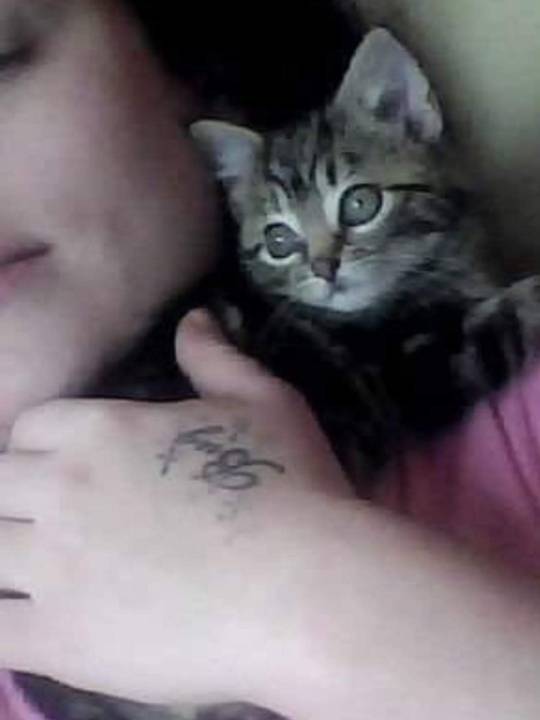

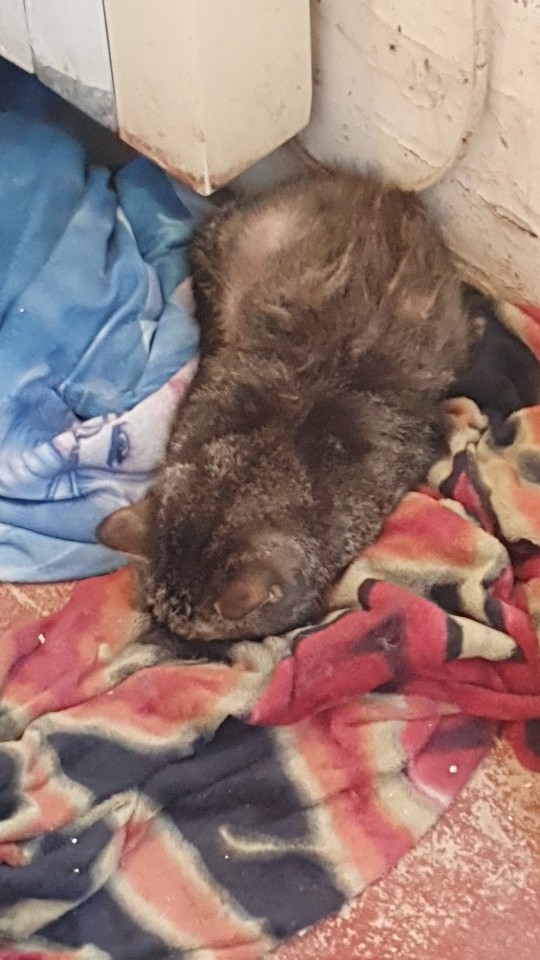
-Pluto
#i miss her#she was my best friend#i had 2 other cats too#but my mom gave them away without asking#i miss her so much#autism#system#osdd system#sysblr#trans
4 notes
·
View notes
Text
Seeing your own trans body and identity as your masterpiece is so important
#luly talks#watching a video allow me to ramble#almost feel like a ringmaster walking in on stage like ladies and gentlemen what you are about to see is something you have never seen befo#when you think about it its not surprising at all that theres such an overlap with autism and queerness#gender is such a thing we are forced to learn and stick to and sometimes we arent even directly taught it usually you just have to go figur#like many social things it is treated as a survival of the fittest a lot of the time#reminds me of my experiences growing up and my insistance of not being a boy or a girl but simply luly#speaking of me. there's something about me that is so strong like. my inability to ever separate the me from myself#no matter where i go or what my body does theres a lingering feeling of the me floating there#this is stepping away from gender and more into dissociation but it would be foolish to ignore the overlap between those two#after all one of the times i was having this. mental breakdown inducing dissociative episode i shared with an aquitance they were like#oh so you are genderfluid. and i was like yeah i guess#there's such an ambiguous sense of the self#HOLY ALMOST LMAO#anyway um. like back to the gender tho#saw this manga panel of this nonbinary beauty as the youtuber called where they say they gave up on being a man but dont claim to be a woma#and it makes me think of myself because i did do that in a way too didnt i?#i gave up on being a woman. but i partly claim to be a man?#but not all the way. not at all.#i've thought about me being a trans man and i am not. i am more than a man#i dont reject womanhood either#i still carry it with me. i once was a little girl.#lately ive been thinking about identity#and i really think that the worst one can do is forget their past because when you do that there's nothing left for you#honestly applies to identities in general such as the idenitty of a nation too#its important to remember how you got here because that is who you are#if you forget your mistakes you are doomed to repeat them again and again#of course. this is an issue for people like me. bc i deal with certain dissociative and general memory issues#lately i've been gaining more memories i thought lost tho. little things. faces of friends of teachers#popping up in my dreams clear as photographs
5 notes
·
View notes